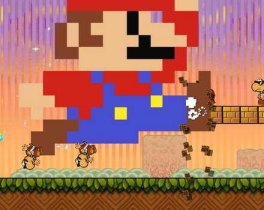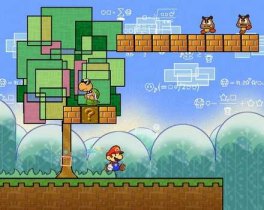Super
Paper Mario for the Wii brings a new perspective to the platforming and
role-playing genres with an innovative title that offers some unique
features. The melding of play styles creates an interesting game, but it's
the ability to switch between 2D and 3D planes that really sets the game
apart. This technique allows you to find hidden objects and areas you
wouldn't discover otherwise. The game is fairly easy to play and
accessible, with some occasionally odd puzzles and tasks, brought together
with a light-hearted, surreal visual approach that makes for an enjoyable
and entertaining title that should appeal to Nintendo fans of all ages.
Combining elements of role-playing with
traditional Mario Bros.-style platforming, Nintendo's Super Paper Mario
continues the popular spin-off series on the Wii while adding a new
dimension to the gameplay. It's definitely one of the more innovative
titles on the system and its persistent inventiveness and clever design
tweaks the familiar formula. As you begin the game, Mario has been
transported once again to a flat world where everything is made of paper.
However, things aren't all peachy-keen since an evil spirit has kidnapped
his beloved princess and his arch-rival Bowser and is threatening to take
over the world. Once again, it's up to our heroic plumber to save the day.
Those who've played the previous titles won't be surprised to learn that
Super Paper Mario takes place in fairly traditional 2D style Mario levels,
and players will spend plenty of time jumping, hitting blocks and throwing
enemies around the screen. However, Nintendo has thrown in a level of
role-playing as well, and you also need to complete tasks, talk to other
NPCs and use items throughout as well. When you collect coins and stars in
the game, you'll be able to purchase items such as power-bricks, mushroom
shakes and more at the various shops. In addition to the regular
characters, you'll also encounter a number of bad guys, including Mario
perennials like the Koopas and spikes. As you go along in your journey,
you'll find yourself alternating between these types of gameplay but the
game has a good balance between these two elements, split almost evenly
between platforming and role-playing. These two styles of play are
integrated seamlessly and you can find yourself doing both during a single
stage. So far, our description of Super Paper Mario probably sounds
familiar, but there's a huge twist in the gameplay that really makes
things interesting.
 If
you go in expecting something truly next-gen, you're probably going to be
initially underwhelmed and disappointed by the game's 2D stages. However,
very early on Mario gets the ability to switch between the flat world and
the third dimension. At this point, the game becomes much more impressive
from a visual and design standpoint. You can switch between these
dimensions by pressing the A button, but this is only available for a
short time as indicated by the energy bar. If your time in the 3D
dimension runs out, you lose energy and have to recharge your time bar by
returning Mario to the flat dimension. When the worlds are transformed to
this new perspective, you'll be able to move around in full 3D space. The
trick here is that some of the enemies and objects remain flat while
others make the transition. This can mean that large obstacles that seemed
impassible are suddenly just a flat like you can walk around. It can also
mean that objects that were in the background, suddenly become paths or
blocks that you can climb onto and use to pass through gaps. Switching
perspectives also lets you discover items and objects that you couldn't
see, such as hidden pipes or doors. This is a really cool feature and
makes the gameplay much more interesting - allowing a completely different
feel to emerge. Super Paper Mario also aids your exploration with a few
companions like the floating Pxl who will help you discover hidden areas.
In some areas, there are hidden doors or objects that can only be
discovered by this aid. Using your Wii-mote, you can point at the screen
in the general direction and find these areas. This is a really cool
addition to the gameplay that makes for an even more diverse and
interesting experience. Super Paper Mario's levels stay fairly true to the
Nintendo conventions and unfold in a fairly linear fashion, though you can
move back and forth between them or warp to the main level using a special
item. As you'd expect, the game's pacing and structure is excellent,
giving players multiple paths to explore without making things overly
complicated. Most of the levels are routine in the way they unfold, but
you'll also have to defeat several bosses along the way and these
encounters are also fairly inventive in their approach and style. There's
an interesting mechanic to switching between the 2D and 3D space, and most
players should probably explore each area in both dimensions before moving
on in order to find everything.
If
you go in expecting something truly next-gen, you're probably going to be
initially underwhelmed and disappointed by the game's 2D stages. However,
very early on Mario gets the ability to switch between the flat world and
the third dimension. At this point, the game becomes much more impressive
from a visual and design standpoint. You can switch between these
dimensions by pressing the A button, but this is only available for a
short time as indicated by the energy bar. If your time in the 3D
dimension runs out, you lose energy and have to recharge your time bar by
returning Mario to the flat dimension. When the worlds are transformed to
this new perspective, you'll be able to move around in full 3D space. The
trick here is that some of the enemies and objects remain flat while
others make the transition. This can mean that large obstacles that seemed
impassible are suddenly just a flat like you can walk around. It can also
mean that objects that were in the background, suddenly become paths or
blocks that you can climb onto and use to pass through gaps. Switching
perspectives also lets you discover items and objects that you couldn't
see, such as hidden pipes or doors. This is a really cool feature and
makes the gameplay much more interesting - allowing a completely different
feel to emerge. Super Paper Mario also aids your exploration with a few
companions like the floating Pxl who will help you discover hidden areas.
In some areas, there are hidden doors or objects that can only be
discovered by this aid. Using your Wii-mote, you can point at the screen
in the general direction and find these areas. This is a really cool
addition to the gameplay that makes for an even more diverse and
interesting experience. Super Paper Mario's levels stay fairly true to the
Nintendo conventions and unfold in a fairly linear fashion, though you can
move back and forth between them or warp to the main level using a special
item. As you'd expect, the game's pacing and structure is excellent,
giving players multiple paths to explore without making things overly
complicated. Most of the levels are routine in the way they unfold, but
you'll also have to defeat several bosses along the way and these
encounters are also fairly inventive in their approach and style. There's
an interesting mechanic to switching between the 2D and 3D space, and most
players should probably explore each area in both dimensions before moving
on in order to find everything.
From a control standpoint, it's easy to
see why the game is so immediately appealing. You hold the Wii-mode
sideways and control Mario using the standard cross-hair and jump using
the side buttons. In this aspect, Super Paper Mario immediately recalls
the classic NES and SNES Mario titles and definitely has their classic
feel and approach. There's been something of a revival of these classic
adventures over these past few years, with New Super Mario Bros. on the DS
last year only the latest example of the trend. These simple and intuitve
controls allow you to get right into the action and make the game highly
accessible. Having to press the A button to switch modes keeps things
simple as well, and gives Super Paper Mario an immediate familiarity.
Things are very smooth throughout, with the classic play mechanics and
strategies very much in evidence. There are some clever twists, such as
the mini-classic Marios that accompany you early on or the massive
old-school sprite Mario you can use to destroy everything in your path as
well, which only enhances SPM's classic vibe. This is even further
enhanced by the aesthetics, which have that classic, surreal Mario feel in
evidence throughout. Some of the early levels bring back some of the
original stages, you'll even find the familiar blocks and ? squares that
have become the series trademark. However, in a slight twist, much of the
game looks blocky and somewhat 8-bit, which gives it a stylish and
pixellated look. The other characters besides Mario also have this look,
and their minimalist, yet fun design give them an immediate appeal. Most
of the game feels derived from the classic era Mario, and even the switch
to 3D doesn't really change this approach, which makes for a consistent
look and feel that is cool and quite appealing.
 While
it would be easy to dismiss Super Paper Mario as yet another kiddie game,
those who overlook the title are missing out on some truly ingenious and
clever gameplay. As usual, Nintendo has created some truly ingenious
levels and tasks that make for a unique experience. The mixture of
role-playing and platforming works well within this context, with a good
balance between the two styles of play. There are loads of secrets to
uncover and plenty of exploration, which makes for an entertaining and
surprisingly deep title. While it's a little bit on the easy side, Super
Paper Mario is a fun to play and creates a unique world. It's visual style
is quite cool and emphasizes the series' classic gaming roots while
remaining modern thanks to it's hybrid 2D/3D approach. The simple and
accessible controls make it easy to get into, but the game's challenging
tasks and fun platforming make for an engaging quest that should appeal to
Nintendo fans of all ages.
While
it would be easy to dismiss Super Paper Mario as yet another kiddie game,
those who overlook the title are missing out on some truly ingenious and
clever gameplay. As usual, Nintendo has created some truly ingenious
levels and tasks that make for a unique experience. The mixture of
role-playing and platforming works well within this context, with a good
balance between the two styles of play. There are loads of secrets to
uncover and plenty of exploration, which makes for an entertaining and
surprisingly deep title. While it's a little bit on the easy side, Super
Paper Mario is a fun to play and creates a unique world. It's visual style
is quite cool and emphasizes the series' classic gaming roots while
remaining modern thanks to it's hybrid 2D/3D approach. The simple and
accessible controls make it easy to get into, but the game's challenging
tasks and fun platforming make for an engaging quest that should appeal to
Nintendo fans of all ages.
Grade:
A

